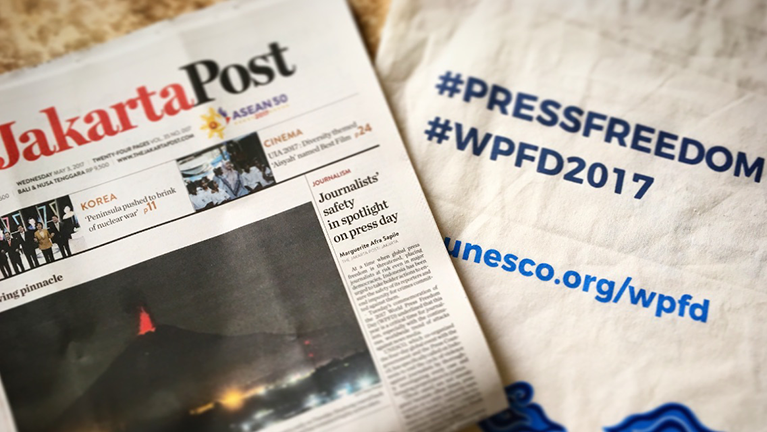Why conflict-sensitive reporting is essential for press freedom

Reporting on violent conflict may be the most dangerous assignment for a journalist. This on-the-ground perspective is critical for understanding conflict, but it also poses a serious threat to reporters in the field. Reporters, however, can also create risks for victims of conflict and can even escalate conflicts. For this reason, it is critical that journalists, as well as development professionals, approach their work with a mindset of “do no harm.”
Conflict is a cycle, beginning with tension that can eventually escalate to violence. Violent conflict may remain for years before it deescalates and transitions to a postconflict period, allowing for reconciliation. Postconflict can be an opportune time for journalists to understand the cycles of conflict and violence, but it is also a volatile moment that can be easily disrupted. Greater attention to reconciliation and peace processes is needed in order to create open, free environments where press can truly thrive.
“I think we have a tendency to simplify, instead of really delving in and trying to understand the complexities of every single conflict that is out there,” said Michelle Betz, a media consultant and panelist on IREX’s panel at World Press Freedom Day. “Conflict is complex. Conflict is not something simple. If we don't try to understand what the complexities involved are, we're not doing our job.”
Achieving conflict-sensitive reporting
The challenge of working in conflict and postconflict areas means both media practitioners and development professionals alike must prioritize a “do no harm” approach to reporting and program implementation. “Doing no harm” means considering the consequences of one’s work, locally and internationally. Practitioners and professionals must analyze and fully understand all possible effects of their planned activities, while also allowing for the opportunity to reflect on these actions after the task is complete.
Barriers to thorough planning and analysis of one’s activities and actions include both lack of time and resources. Too frequently, practitioners and professionals drop in and out of conflict areas without sufficient preparation and understanding of the local context. They also work with tight deadlines and lack the time needed to build and understand local relationships.
Nevertheless, practitioners and professionals must integrate a conflict-sensitive “do no harm” approach that is professional and ethical. Regardless of time and resources, before beginning the process as well as throughout, one should always ask: What is my motivation? Why am I using particular words and pictures? Am I taking something out of context? Am I causing harm?
Focusing on neutrality and facts is another way to achieve conflict-sensitive reporting. Misinformation and suppression are often associated with conflict; therefore, practitioners and professionals must verify facts to ensure they are delivering precise and reliable information. Media can and should act as educators for the public and must prioritize accuracy over agenda.
“[We must]… revert back to what we do as journalists,” said Betz. “And that is professional, ethical, transparent, accountable, accurate, fact-based—not opinion, fact-based—journalism, trying to capture all sides whenever possible.”
How IREX supports press freedom and conflict-sensitive reporting
At IREX, we subscribe to the “do no harm” approach in our programming. This commitment extends beyond logistics and communications to the way IREX tailors content and creates approaches that reach beneficiaries. This is a critical component of the Securing Access to Free Expression (SAFE) Initiative, which aims to equip media practitioners and human rights defenders with the means to resiliently continue their work. Through integrated trainings that address safety through the lens of digital identity, physical awareness, and psychosocial care, media practitioners receive the knowledge and skills to manage their risks and support media-community solidarity.
IREX also implements numerous programs that strengthen local media institutions in closing spaces and teaches media literacy in areas where propaganda is prevalent. The Supporting Independent Media in Syria (SIMS) project supports Syrian broadcasters and independent media produce accurate information that promotes tolerance. And Learn to Discern has helped thousands of citizens in Ukraine separate fact from fiction and identify and interpret misinformation through a variety of engaging platforms, including videos, games, and interactive learning experiences. A product of IREX’s engagement in Ukraine, the Citizen Media Literacy Trainer’s Guide, also aims to combat misinformation and hate speech.
This year for World Press Freedom Day, IREX hosted a panel discussion in Jakarta, Indonesia on conflict-sensitive reporting. Panelists tackled the above themes during an in-depth dialogue, highlighting topics such as media literacy, journalist safety, fake news, and conflict reporting. Bringing together a diverse group of practitioners and researchers, the discussion offered audience members real-life practical tips on reporting from conflict and post-conflict areas.
“Reporters face a difficult position when put in conflict situations,” said panel attendee and IREX Senior Technical Advisor Leon Morse. “They find heartbreaking human suffering and often parties to the conflict that may be sympathetic or stand for positions that are antithetical to the journalist's own views.”
By prioritizing truth and facts and reporting with a “do no harm” mentality, journalists and media workers can put conflict-sensitive reporting in practice. As a result, practitioners and professionals not only promote conflict-sensitive reporting, but also strengthen media professionalism and educate the public—both key to democracy and press freedom. IREX works in a variety of ways to support the accuracy, accountability, and professionalism of media, as well as citizen engagement with media. Learn more about IREX’s media projects and how IREX is working to promote freedom of expression.